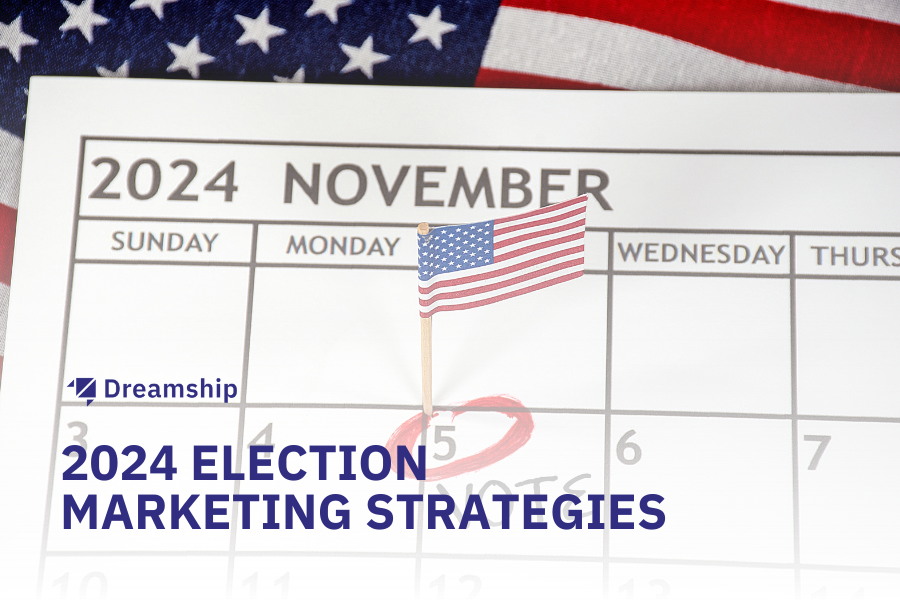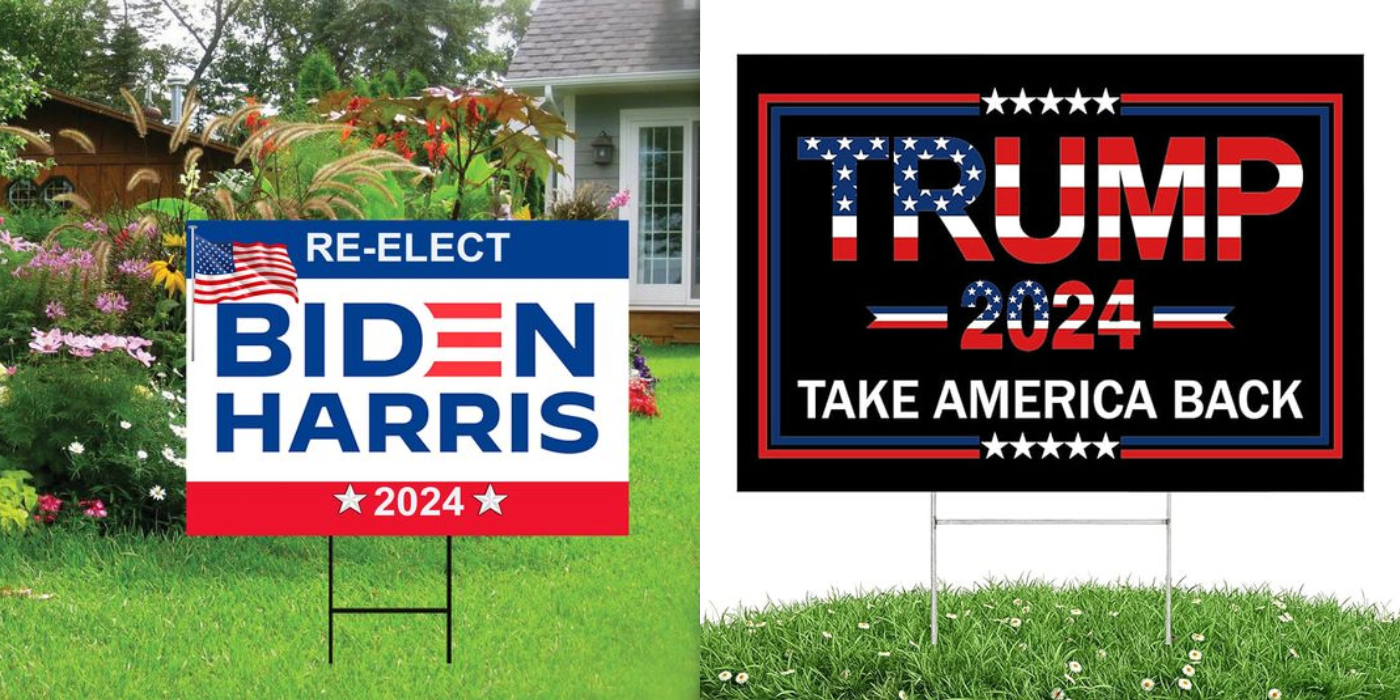As the 2024 election season heats up, it presents a unique opportunity for online sellers to engage with the American public in meaningful ways. However, it’s important to recognize that elections in the United States are highly divisive.
While this period can be advantageous for business, it also carries risks, especially when making political statements as a brand.
For those willing to navigate this complex landscape, this blog post will guide you through understanding the demographic landscape, key events, and effective marketing strategies to capitalize on this period.
Understanding the American Public During Election Season
Election season in the United States is a period of heightened interest and activity. Americans are more engaged with news, social media, and political discourse. This increased attention can translate into significant marketing opportunities for online sellers who know how to tap into the prevailing sentiments.
Key characteristics of the American public during this time include:
Increased Media Consumption: People are glued to their screens, following debates, rallies, and political commentary. This means there are more eyeballs on digital platforms, providing an opportune moment for digital advertising and social media engagement.
Heightened Emotions: The election season can stir strong emotions, both positive and negative, which can be channeled into marketing messages. Whether it’s through humor, hope, or urgency, aligning your message with the emotional tone of the season can increase engagement.
Diverse Opinions: The electorate is divided, offering chances to target specific segments with tailored messages. Understanding the political landscape and the key issues that matter to your audience can help you craft more effective marketing campaigns.
Key Events to Focus On
Presidential Debates
- First Debate (June 27, CNN):
The first presidential debate will be held on June 27 in CNN’s Atlanta studios with no audience present. It will start at 9 p.m. ET, moderated by Jake Tapper and Dana Bash. This format was chosen to avoid the influence of live audiences, as requested by the Biden campaign, despite Trump's preference for a larger venue. - Second Debate (September 10, ABC News):
The second debate will take place on September 10, hosted by ABC News. While the exact time and audience presence are yet to be confirmed, it will be moderated by David Muir and Linsey Davis and aired during prime time on ABC News, ABC News Live, Hulu, and other broadcast and streaming platforms.
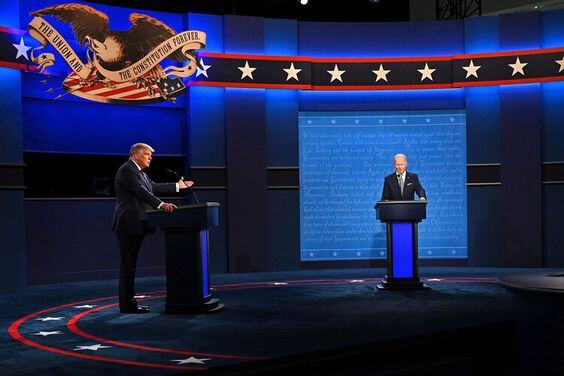
National Conventions
Both major parties hold conventions that draw significant media attention. This is prime time for thematic promotions. Consider launching special edition products or offering limited-time discounts during these events to capitalize on the buzz.
- Republican National Convention: July 15-18 in Milwaukee.
- Democratic National Convention: August 19-23 in Chicago.
Election Day
The climax of the election season, offering peak engagement opportunities. Prepare for this day with targeted ads, social media campaigns, and email marketing blasts to maximize visibility and drive sales.
Marketing Opportunities and Strategies
Politically Themed Merchandise
- Custom Apparel: T-shirts, hats, and hoodies with election-related slogans or designs. This type of merchandise can be tailored to both parties or remain neutral, allowing you to appeal to a broader audience.
- Signs and Flags: Affordable and popular items that supporters love to display. These can be easily customized and serve as great conversation starters.
Content Marketing
- Blog Posts and Articles: Write about election issues that align with your brand values. For example, if your brand advocates for sustainability, discuss the environmental policies of the candidates.
- Social Media Campaigns: Engage in conversations related to the election. Consider running polls, sharing relevant news, and encouraging viewer engagement.
Email Marketing
- Informative Newsletters: Keep your audience informed about key election dates and how your products relate. Share insights, offer commentary, and provide links to relevant articles or blog posts.
- Promotional Offers: Time-limited discounts and offers tied to election events. For example, offer a discount code on Election Day or run a sale during the national conventions.
Influencer Collaborations
Partner with influencers who have a strong political following to promote your products. Influencers can provide authenticity and reach, helping to spread your message to a wider audience.
Demographic Information and Targeting
Understanding who is most engaged during election season can help you tailor your marketing efforts.
Race and Ethnicity
Today, 67% of registered voters are White, 13% are Hispanic, 11% are Black, and 4% are Asian. Both parties are more racially and ethnically diverse than three decades ago, but not to the same degree.
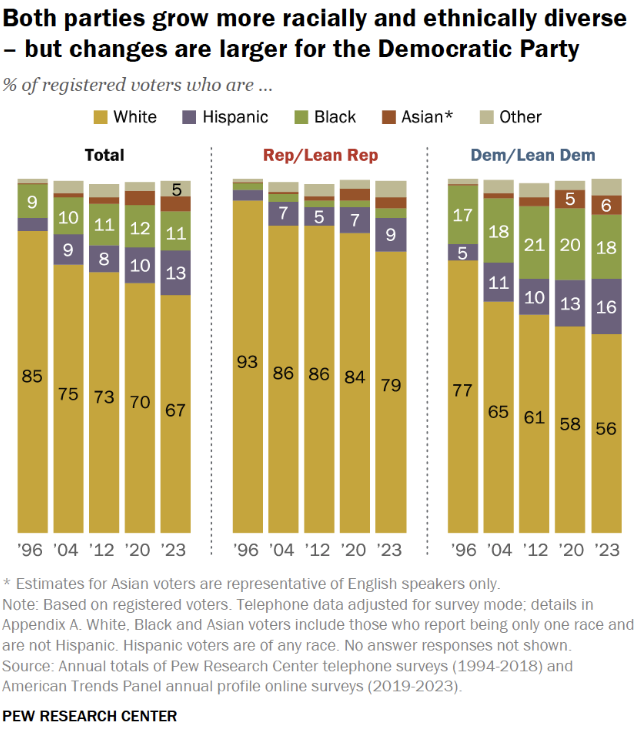
Age Groups
About two-thirds of Republicans are 50 and older, compared with slightly more than half of those who associate with the Democratic Party. The share of voters under 30 is twice as large among Democrats (16%) than Republicans (8%). A similar share in each party falls between the ages of 30 and 49 (27% among the Republican Party and 31% among the Democratic Party).
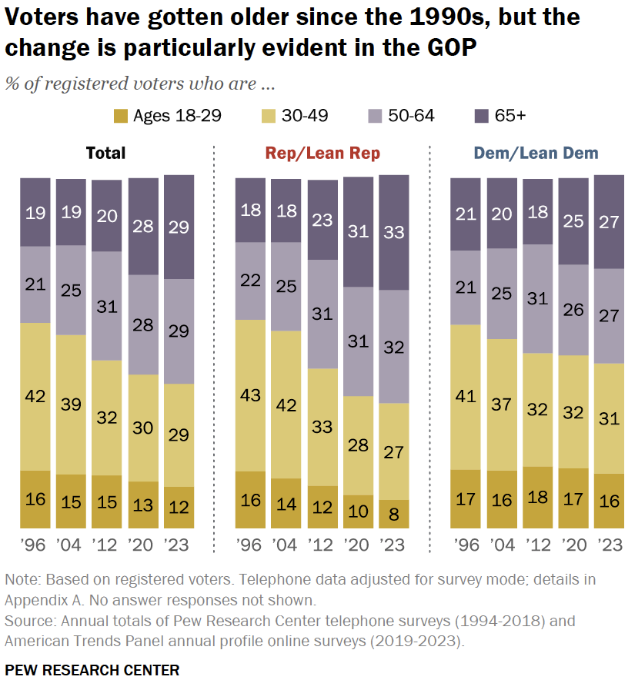
- 18-29: Because young voters are highly active on social media, use platforms like Instagram and TikTok for your campaigns. This demographic is also more likely to engage with interactive content like stories, polls, and challenges. However, avoid posting political and election news on social media. According to Pew Research, both Democrats and Republicans (including independents who lean toward either party) do not trust social media sites as sources for political and election news. And the most distrusted are three giants – Facebook, Instagram and X.
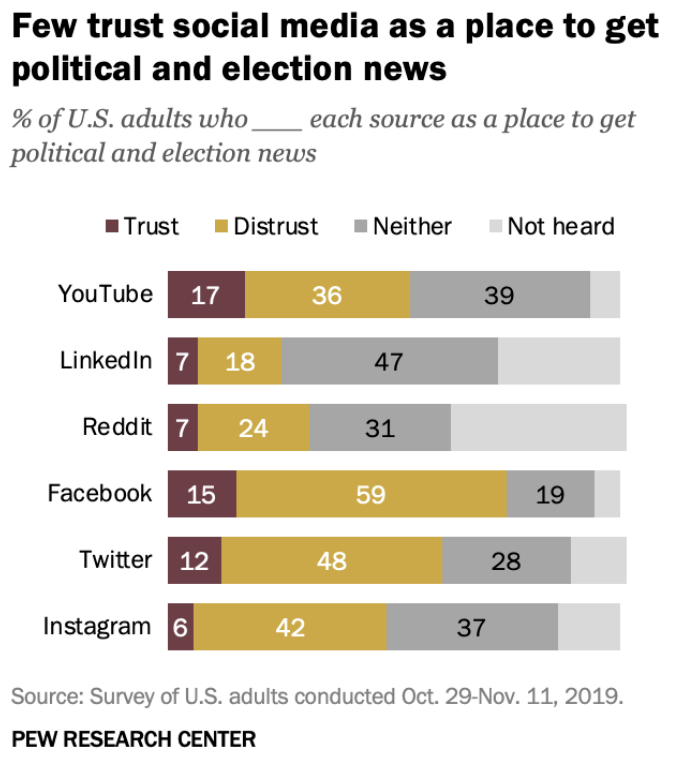
- 30-49: This group consumes a mix of social media and traditional media. A balanced approach across platforms can work well here. Consider using Facebook and LinkedIn for more in-depth discussions and X for real-time engagement. While this group also shares distrust in the source of their information, unlike the younger generation, this group’s distrust is more heavily biased by the political party they align with. A great example is their distrust in news sources.
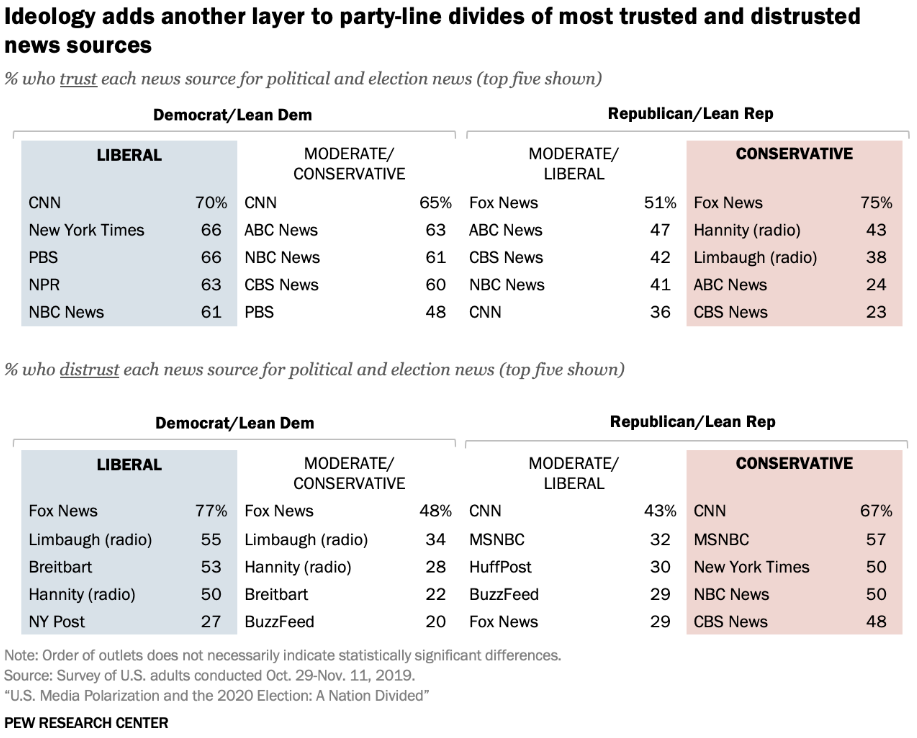
- 50+: Older voters tend to follow news through traditional media (see above for traditional media bias). Email marketing and Facebook campaigns can be effective. Ensure your messages are clear and informative, catering to their preference for detailed content.
Geographical Insights
Focus on swing states where election interest is highest. These include states like Florida, Pennsylvania, and Wisconsin. Tailoring your content and promotions to these regions can increase relevance and engagement.
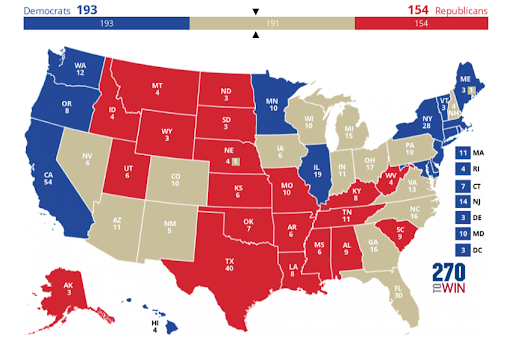
Additional Marketing Tips
- Stay Relevant - Ensure your content is timely and relevant to the current election discourse. Monitor the news and social media trends to keep your campaigns up-to-date.
- Be Authentic - Authenticity is key. Engage in genuine conversations and avoid coming off as opportunistic. Show that your brand cares about the issues and values that matter to your audience.
- Leverage User-Generated Content - Encourage your audience to tag your brand in posts that share their experiences with your products. Run contests or campaigns that invite users to submit photos, videos, or stories.
Quotes and Phrases
Democratic Party - Originals
- "Yes We Can" - Popularized by Barack Obama during his 2008 presidential campaign, this phrase became a symbol of hope and change
- "Change We Can Believe In" - Another significant slogan from Barack Obama's 2008 campaign, emphasizing a vision for progressive change
- "Stronger Together" - Hillary Clinton's campaign slogan in 2016, promoting unity and collective strength
- "Build Back Better" - Joe Biden's slogan for his 2020 campaign, focusing on rebuilding the economy and society post-COVID-19 with an emphasis on inclusivity and improvement
- "Medicare for All" - A phrase commonly used by progressive Democrats advocating for universal healthcare, reflecting a major policy goal for the party
Democratic Party - Inspired
These phrases can help convey the party's focus on unity, social justice, environmental sustainability, and inclusive economic growth.
- "Together We Rise" - Emphasizes unity and collective progress
- "United for Progress" - Highlights the importance of coming together to achieve societal advancements
- "Equity for Everyone" - Reflects a commitment to fairness and equal opportunity for all individuals
- "Healthcare for Humanity" - Supports the goal of universal healthcare access for all
- "Dignity and Decency" - Promotes respectful and humane treatment of all individuals
Republican Party - Originals
- "Make America Great Again" - Popularized by Donald Trump during his 2016 presidential campaign
- "Keep America Great" - Donald Trump's slogan for his 2020 reelection campaign
- "America First" - Used by various Republican politicians, including Donald Trump, focusing on prioritizing American interests in policy decisions
- "Defend the Second Amendment" - A common phrase among Republicans supporting gun rights
- "Drain the Swamp" - Another phrase popularized by Donald Trump, calling for the reduction of corruption and bureaucracy in Washington, D.C.
Republican Party - Inspired
- "Strength Through Unity" - Emphasizes the importance of a united front to maintain national strength
- "Freedom for All" - Highlights the value of individual liberties and personal freedom
- "Empower Individual Choice" - Supports the idea of personal responsibility and decision-making freedom
- "Safety and Sovereignty" - Prioritizes national security and the protection of national sovereignty
- "Prosperity with Principles" - Advocates for economic growth while maintaining strong ethical standards
Conclusion
For those willing to make political statements as a brand, the 2024 election season is a golden opportunity to connect with the American public. By understanding the demographic landscape and strategically planning your marketing efforts around key events, you can capitalize on this period of heightened engagement. Remember to stay relevant, be authentic, and make the most of this dynamic time.
Don’t miss out on the latest marketing tips, strategies, and updates. Subscribe to our email newsletter today and get all the insights you need to maximize your sales during the 2024 election season and beyond.
Join our community today and take your business to the next level!
